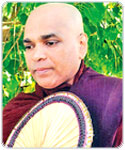|
Lesson for mindfulness - part 27:
Chapter Four: Metta (Loving-Kindness)
Metta as a tool to remove
anger, jealousy and hatred
 Battaramulla Battaramulla
Siri Sudassanarama
Sadaham Senasuna
Ven. Dr. Mirisse Dhammika Thero
Certainly, we all have faults and limitations, and a complacent attitude to them
is no use.
They should be acknowledged and lived with until they have been gently
undermined. Buddhism does not hold that faults are best undermined by repressing
them, or doing battle with them as hateful enemies: to do so simply to
strengthen aversion and ill-will. It is like trying to untangle a ball of string
by pulling at it; it only makes matters worse.
A good attitude to have is that of forgiving oneself-as that helps one to be
able to forgive others.
 When the practitioner interacts with fellow humans, in a school, office or even
in a bus or train, he is able to maintain his ‘mental harmony’ without being
agitated or angry. When the practitioner interacts with fellow humans, in a school, office or even
in a bus or train, he is able to maintain his ‘mental harmony’ without being
agitated or angry.
Metta/ Loving-Kindness moves his/her mind to create the same feelings toward
others as he/she has towards himself/herself’ “I love myself, and, as I do not
with to get sick or create problems, I will be happy.
If everybody loves themselves and strives not to get sick or get into problems,
then, they will become happy too. I wish that I and everybody around me will be
well and happy.”
This can be critical to someone who is not familiar with Loving-kindness, and
might think it does not fit in modern society, which is mostly economically and
socially competitive and aggressively competes for status.
In order to be able to genuinely like others, one must first get on good terms
with oneself, experiencing what it is like to feel Loving-Kindness – initially
for the person it should be the easiest for us to like.
If one can accept oneself and with oneself well, with all one’s (real and
imaginary) faults-liking oneself ‘warts and all’, then one can do this as
regards others, too.
Often, we most dislike in others what we dislike in ourselves, so this is
another good reason to start with oneself.
Next, concentrate your happy thoughts on your parents; then, family members;
teachers, friends, neutral people, unfriendly people, and all living beings,
following the same format as above.
The standard and traditional order is: one should concentrate one’s positive
thoughts first on himself, then on those closest to himself, and then towards
those increasingly distant from him.
One directs happy thoughts towards oneself first because it is easier to arouse
metta towards oneself. Once metta is aroused, one can then direct it outwardly
towards others.
It is very difficult to feel positive towards others when one feels negative
about oneself. The meditator directs happy thoughts in this progressive order
simply because it is easier to feel positive towards those close to himself.
Over time, one will more easily be able to feel positive thoughts towards
neutral or unfriendly people.
The meditator should create each person’s image in the mind. For example, you
should visualize your parents’ faces while they are in a happy mood.
Following this pattern, you should concentrate on each of the people listed
above, and you can expand this list to include any individual you wish.
If you have difficulties with directing loving-kindness towards somebody, who is
unfriendly to you or with whom you have a temporary misunderstanding, you should
reserve directing metta towards him until your mind is well established on metta
by practicing loving-kindness towards other people.
When one has a misunderstanding or dispute, metta has no opportunity to arise
because negative thoughts are occupying the mind.
Having generated thoughts of metta for himself first, one should now concentrate
on one’s loved-ones, beginning with the members of one’s family, suffusing each
one with pure thoughts of loving- kindness.
While spreading metta towards one’s own family members, care should be taken to
think to very dear ones, like one’s parents, brothers and sisters, or any other
close family members. |